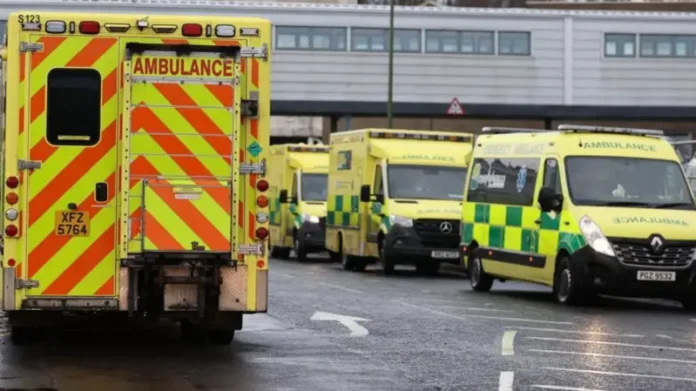A new report has revealed that ambulance handover delays in Northern Ireland are putting lives at risk, with thousands of patients potentially harmed due to the growing crisis. According to the Comptroller and Auditor General, approximately 3,800 patients were at risk of significant harm in the last year due to delays in transferring them from ambulances to emergency departments (EDs).
The report highlights a dramatic decline in ambulance handover performance, which has been worsening for years. Targets stipulate that all ambulance handovers should be completed within 15 minutes, but in reality, many patients are waiting much longer. Last year, 31 people died while waiting for an ambulance, a sharp increase from just four years ago, when the number of deaths was much lower.
Claire Smales, whose father Robert, an 88-year-old man with dementia, had to wait 23 hours for an ambulance in January, described the situation as “frustrating.” Once her father was finally admitted to the Ulster Hospital, he faced further delays, including a nine-hour wait in the ambulance and an additional eight hours inside the emergency department before being seen by medical staff.
“The entire experience was an ordeal for him,” Claire said. “And it was frustrating for the ambulance staff as well. They wanted to help people, but they were stuck with my father outside the hospital for hours.”
The report also shows that delays have been escalating, with some patients waiting more than three hours for handovers, up from around 400 such incidents five years ago. In December 2024, the longest wait recorded was an alarming 23 hours. Only 7% of ambulance handovers in Northern Ireland met the 15-minute target in the past two years, far below the performance of England and Wales.
The Northern Ireland Ambulance Service (NIAS) attributed the delays to pressures on the entire health and social care system, particularly the bottleneck at EDs. Ambassadors are becoming increasingly tied up outside hospitals, unable to offload patients, which in turn impacts the ability to respond to emergency 999 calls.
The report also raised concerns over the rise in Serious Adverse Incidents (SAIs), which are events that could have led to harm, including loss of life. The number of SAIs attributed to ambulance delays has increased from eight in 2020-21 to 35 in 2023-24. In the last year alone, the NIAS recorded a significant increase in delayed handovers, with over 11,000 instances taking longer than three hours.
One of the key findings in the report is the growing reliance on private ambulances, which has increased by 5,000% over the past five years. However, these private ambulances are unregulated, raising concerns about their safety and effectiveness. Last year, private ambulances were used more than 1,000 times for emergency purposes, costing the public £3.6 million.
In response, the Department of Health has acknowledged the seriousness of the situation. A spokesperson said the report underlined the scale of the pressures facing health services, and that a “whole system” approach was needed to address the problem. The department also said additional funding would be required to alleviate some of the pressures.
Dr. Nigel Ruddell, Medical Director at NIAS, expressed hope that the report would act as a catalyst for change. “We are hoping this powerful report will lead to a greater understanding of the challenges we face and drive significant change within the system,” he said.
The audit office’s report made several recommendations, including the urgent implementation of measures to improve ambulance handovers, better oversight of the private ambulance sector, and better collaboration between health trusts and the NIAS.
Despite the Department of Health’s response, it remains to be seen whether the recommended changes will be implemented quickly enough to address the immediate risks posed by these delays.
















